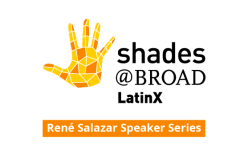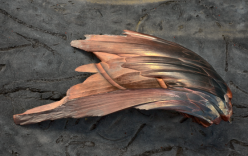Unable to get their mitts on the new Girl Scout cookies that come garnished with messages of affirmation, the scribes pen their own inspirational content for our reading enjoyment: a CRISPR-Cas9 study that could lead to new therapies to combat the flu, a Nature review that highlights the genome's importance and it's future (and includes some of our very own Broadies' perspectives), and a bevy of preprints to whet your science palate. Go get 'em!
Is there anything about the Girl Scout Cookie business model that isn't genius?* The selling season launches just as we collectively crash from our holiday sugar highs, and the cookie varieties change just often enough to keep us curious. This year brought news of the Lemon-Up: a citrusy confection stamped with affirming messages such as "I am an innovator," "I am bold," and "I am a risk-taker." A cookie that makes you feel good about yourself whilst you shove it in your face? We resolved to buy ten boxes each from every pint-sized Broadie, or parent of same, who hawks them.
We then recalled that Girl Scout Cookies are produced by two different bakeries offering slightly different varieties, meaning that cookies sold in one region may not be available in another. Frantic, we consulted the map of Girl Scout Cookie bakery regions that we keep in our wallets. Turns out New Yorkers, San Franciscans, Los Angelenos, and even our neighbors in Vermont and New Hampshire will chow down on Lemon-Ups this season, but here in Eastern Massachusetts, life gives us Lemonades. Why should Californians nibble iced shortbread garnished with affirmation as they bask on the beach in February, while we Cantabrigians self-medicate our winter blahs by puckering up to a cookie that on purpose mimics a lemon slice? Are our expressions not sour enough already?
Parents of Broadie Brownies, we'll still hit you up for Thin Mints. So many Thin Mints. But unless your darling little entrepreneurs hand-etch them with inspiring phrases (we suggest "Food is fuel, not failure" or "At least I’m consuming sustainably produced palm oil"), we'll be forced to source our self-esteem from other suppliers. Between now and the end of the selling season, we shall travel to points north, west, or south at every opportunity to get our fix. That said, if any of our gentle readers should find themselves in Lemon-Up territory, and if a box or five should happen to turn up in the scribes' den, we'd say, "Thanks-A-Lot." (During the current selling season, at least. Next year, no guarantees.)
*Others may beg to differ, but we'll let them speak for themselves.
We turn now from shortbread to short takes on the week’s Broad news:
The kinase keymaster
Mutated cells that are resistant to kinase-inhibiting cancer drugs can help reveal whether the drugs are hitting their intended molecular targets, but it’s been difficult to predict the best genomic spots to alter. A team including Nicole Persky, Cory Johannessen, Desiree Hernandez, Lisa Brenan, and Mariana Do Carmo used saturation mutagenesis to reveal nearly 30 residues in kinase genes that can mediate resistance. A number of these sites appear to induce resistance across different kinases, and a single site, dubbed the Keymaster, appears to drive resistance via kinase activation. Taking the same approach for other protein families could help improve drug discovery. Read more in Nature Structural and Molecular Biology.
A new view of the flu
The influenza A virus (IAV) poses a major public health threat. Like most viruses, IAV has a relatively small genome of its own, and relies on its host’s machinery to replicate. Using CRISPR-Cas9 screens to systematically disable genes in human cells, a team led by Bo Li, Nir Hacohen, and colleagues has identified 121 host genes required for IAV to complete its life cycle — some of which could inform new therapeutic targets. The team further reports on associated mechanistic discoveries and a new analytical approach that incorporates their findings into the existing evidence base for influenza dependencies. Read more in Nature Communications.
The genesis of germ cells
The process of making germline cells from human pluripotent stem cells is called in vitro gametogenesis. The success of this process depends on the quality of a subset of cells called primordial germ cells (PGCs). A team led by Di Chen (UCLA), Na Sun, Lei Hou, Manolis Kellis, and Amander Clark (UCLA) performed single-cell RNA sequencing of more than 100,000 human PGC-like cells and used computational algorithms to understand the molecular events that lead to the development of these cells. Their work, published in Cell Reports, uncovered an essential mechanism associated with successful initiation of in vitro gametogenesis.
25 years of human disease genetics
Our knowledge of human genetics and how the genome works, while still far from complete, has grown by leaps and bounds over the last quarter-century. In a review in Nature, Melina Claussnitzer, Sek Kathiresan, Cecilia Lindgren, Daniel MacArthur, Heidi Rehm, and several other geneticists from around the world celebrate the last 25 years' progress in exploring the genome's influence over traits and disease, briefly describe the communities and technological breakthroughs behind that progress, and ruminate on the challenges and opportunities the field faces today.
Now in preprint
-
Pathomic fusion: An integrated framework for fusing histopathology and genomic features for cancer diagnosis and prognosis (Faisal Mahmood and colleagues)
-
Combining case-control status and family history of disease increases association power (Alkes Price and colleagues)
-
Quantifying genetic effects on disease mediated by assayed gene expression levels (Alexander Gusev and colleagues)
-
Microglia depletion disrupts normal functional development of adult-born neurons in the olfactory bulb (Beth Stevens and colleagues)
-
Improving the informativeness of Mendelian disease pathogenicity scores for common disease (Alkes Price and colleagues)
-
Transcriptional and cellular diversity of the human heart (Nathan Tucker, Mark Chaffin, Patrick Ellinor, and colleagues)
-
Tracing the evolutionary history and global expansion of Candida auris using population genomic analyses (Jose Muñoz, Christina Cuomo, and colleagues)
-
The causal role of circulating vitamin D concentrations in human complex traits and diseases: a large-scale Mendelian randomization study (Chia-Yen Chen and colleagues)
-
Plasmodium falciparum population genetic complexity influences transcriptional profile and immune recognition of highly related genotypic clusters (Dyann Wirth and colleagues)
-
Re-examining physician-scientist training through the prism of the discovery-invention cycle (Gopal Sarma and colleagues)
From the blogosphere
-
The anticipation parallelogram (Eric Minikel, CureFFI.org)
In the news
Andrew Anzalone, a postdoc in David Liu’s lab, discusses prime editing with Nature, and Heidi Rehm, also in Nature, makes the case for one meeting-free week per quarter.
What to do next week (and beyond)
Learn how data is transforming patient care at a Broad-hosted Massachusetts Life Science Center talk, “Beyond bits to bytes,” on Monday, January 13. Anne Carpenter is among the panelists.
Hear current and past Broad artists-in-residence discuss how their time at Broad influenced their work at a gallery talk and reception on Tuesday, January 14.
Want to take an emerging scientist under your wing? Attend an upcoming info session on Wednesday, January 15 or Thursday, January 30 to learn about mentoring an undergrad over the summer as a part of the Broad Summer Research Program or the Broad Summer Scholars Program.
If you are a grad student, postdoc, or junior faculty member looking to grow your research, check out the NHLBI BioData Catalyst Fellows Program, which aims to provide funding for heart, lung, blood, and sleep early career researchers. Learn more about this fellowship opportunity by visiting this blog article. The deadline for applications is Friday, January 17.
Volunteer with co-workers, friends, and family at the 2020 Cambridge MLK Day of Service on Monday, January 20. Honor Dr. Martin Luther King Jr.'s legacy by joining in service projects to benefit those in need. To learn more and register, see the Intranet.
David Liu and Feng Zhang take the stage on Tuesday, January 21, for the next Broad@15 talk, “The extraordinary evolution of genome editing.” Bookmark the live stream link to watch from anywhere.
It’s the Year of the Rat! Celebrate Lunar New Year with AAA, a subgroup of Shades@Broad, on Thursday, January 24.
Send your compound submissions to PRISM by Friday, February 7 for their February 2020 screen on 750 cancer cell lines (including suspension and adherent lineages). Email the PRISM team for details.
There's a lot more going on. See the CalendarBroad for January 13–17 for more talks, meetings, and special events.
We’re off to our daily #AMA with the scribelets. Have a good weekend.
–The BroadCast team
David Cameron
Allison Dougherty
Leah Eisenstadt
Amanda Dykstra Esposito
Alana Folsom
Corie Lok
Namrata Sengupta
Tom Ulrich
Karen Zusi
Have a tip for a future BroadCast? Want to tell us what you thought of this one? Write to the BroadCast team. Wednesday at noon is the deadline to submit items for Friday publication.





